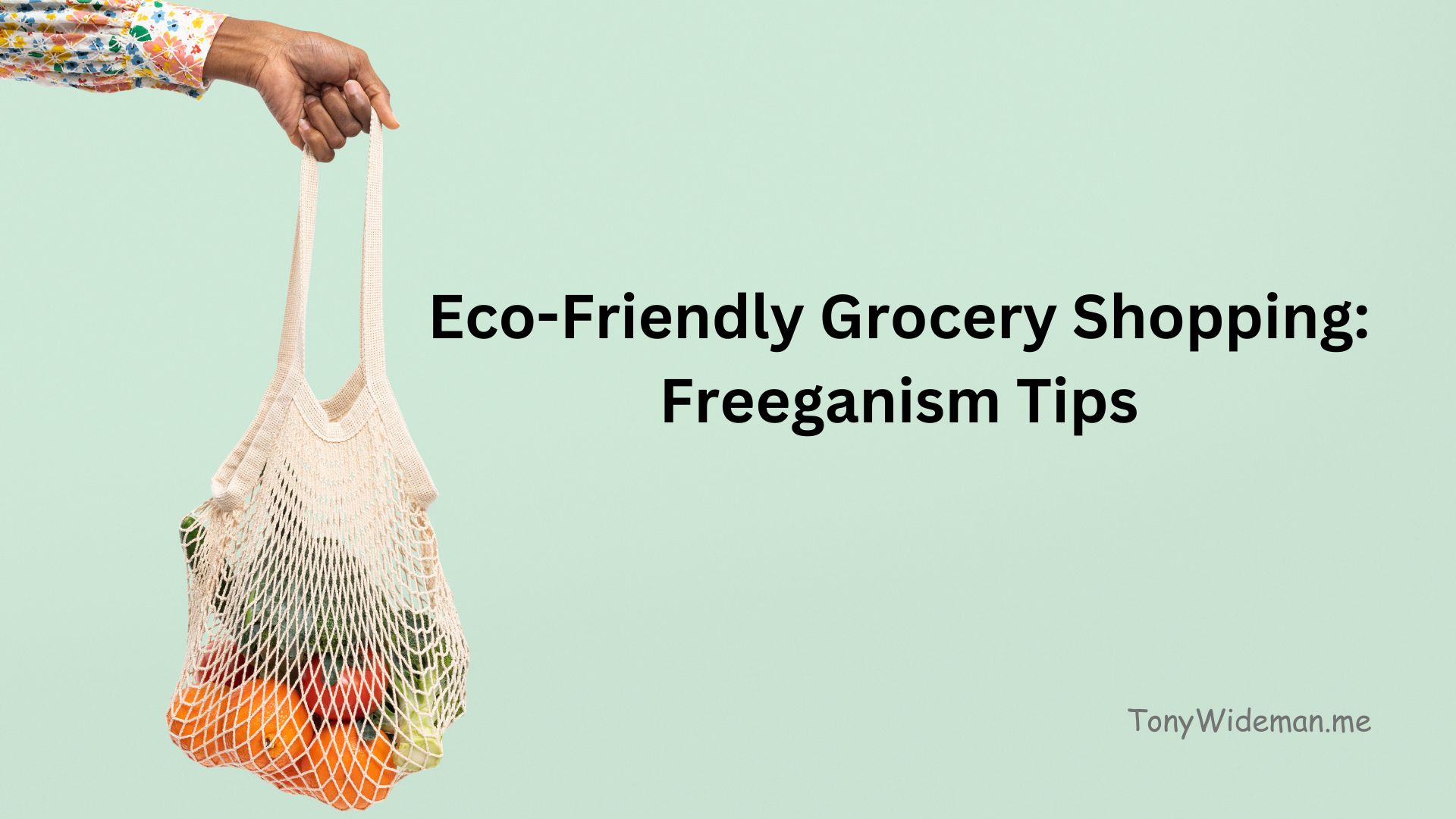Eco-Friendly Grocery Shopping: Freeganism Tips

Environmental concerns are at the forefront of our minds, and finding ways to make our daily routines more eco-friendly has become increasingly important. One area where we can make a significant impact is in our eco-friendly grocery shopping habits.
Enter Freeganism, a sustainable lifestyle that focuses on reducing waste and consumption. In this post, I will explore the concept of Freeganism and offer valuable tips on incorporating it into your grocery shopping routine.
Understanding Freeganism
What is Freeganism?
Freeganism is a lifestyle movement that seeks to minimize waste and consumption.
It involves obtaining discarded or excess food, clothing, and other goods to reduce one’s environmental impact and promote sustainability.
The Philosophy Behind Freeganism
At its core, Freeganism challenges the idea of a consumer-driven society. Freegans believe in living ethically by reducing waste, conserving resources, and sharing with their communities.
Benefits of Freeganism
Reducing Food Waste
One of the primary benefits of Freeganism is the significant reduction in food waste.
By rescuing discarded food, Freegans help reduce the alarming levels of food waste in our society.
Saving Money
Freeganism can also help you save money.
By obtaining goods at minimal or no cost, you can reduce your expenses and reallocate your resources to more meaningful pursuits.
Reducing Environmental Impact
Every item that Freegans rescue from landfills or dumpsters reduces environmental harm.
This sustainable lifestyle choice helps decrease the demand for new production and reduces the carbon footprint associated with manufacturing.
Getting Started with Freeganism
Finding Freegan Communities
To start your Freegan journey, connect with local Freegan communities.
These groups often share information, resources, and experiences that can help you transition into this sustainable lifestyle.
Dumpster Diving 101
Dumpster diving is a key aspect of Freeganism.
Learn the ropes of safely retrieving discarded items, including food, from dumpsters in your area.
Eco-Friendly Grocery Shopping Tips
Shop at Local Farmers’ Markets
Supporting local farmers’ markets not only reduces the carbon footprint associated with transportation but also allows you to access fresh, seasonal produce.
Buy in Bulk
Buying in bulk reduces packaging waste and can save you money in the long run.
Invest in reusable containers to minimize plastic waste.
Embrace Seasonal Eating
Eating seasonally means consuming fruits and vegetables that are naturally abundant during certain times of the year.
This reduces the need for energy-intensive storage and transportation.
Reduce Packaging Waste
Choose products with minimal packaging or opt for package-free alternatives.
Bring your reusable bags and containers when shopping.
Grow Your Food
Consider starting a small garden or growing herbs on your windowsill.
Homegrown produce is not only eco-friendly but also rewarding.
Keep a running inventory.
Use pen and paper, download an app, or tack a whiteboard to the refrigerator — find a way to keep track of what you need and note as items run out.
A friend of mine and her spouse use a shareable Google Doc so each can add what is needed.
Limit Your Shopping
Cutting back on unnecessary trips to the grocery is especially important during the pandemic when we are practicing social distancing, but it’s also a good habit to form.
To do this, you’ll need to create a meal or cooking plan.
Buy Locally Grown/Raised Foods
Look into nearby farmers’ markets, on-farm markets, or community-supported agriculture programs (CSA).
Many of these use limited packaging or allow you to bring your containers. Often, vendors grow or raise their food organically and humanely.
And because the food is grown nearby, less fuel is used to get it to you.
Bring Your Bags
Many of us are bringing our shopping bags to carry our food home, but still peel off bag after bag in the produce section.
For produce, huge items like bananas, put them directly in your cart.
For smaller or more tender items, invest in reusable bags, such as washable mesh bags like those sold for laundering delicates.
Read Labels Carefully
Just because an item is labeled Earth-friendly doesn’t make it so. “Greenwashing,” deceptive labeling with words like “eco-friendly” or “all-natural,” abounds.
Educating yourself about labels will be an ongoing process.
Consider The Packaging
Look for food packaged in cardboard, cartons, cans, or glass rather than plastic or foam. And look for food in recycled or recyclable containers.
Some grocery stores also offer biodegradable, package-free, or package-light shopping.
Put Food Away Thoughtfully
Use the first-in, first-out system for arranging the pantry, refrigerator, and freezer. Move older foods to the front and fresher foods to the back.
As you put food away, consider what you will use right away and correctly process and, if possible, freeze the rest, date it, and record weights/amounts. Produce such as fresh herbs, garlic, onions, peppers, and celery freezes well.
Creating a Freegan-Friendly Meal Plan
Meal Planning Basics
Plan your meals around the food you find or rescue. Be creative with your recipes to make the most of your Freegan discoveries.
Incorporating Found Foods
Integrate rescued items into your meal plans.
Freeganism often leads to exciting culinary adventures.
Overcoming Common Challenges
Dealing with Social Stigma
Address any social stigma associated with Freeganism by educating others about the environmental and ethical aspects of your choices.
Ensuring Food Safety
Practice food safety guidelines when handling rescued food.
Learn to discern safe from spoiled items.
Balancing Convenience and Sustainability
Striking a balance between convenience and sustainability can be challenging.
Find a routine that works for you without compromising your values.
Freeganism and Ethical Considerations
Ethical Implications of Freeganism
Explore the ethical dimensions of Freeganism, which challenges consumerism and promotes sharing within communities.
Supporting Sustainable Brands
When not relying on rescued goods, choose products from sustainable and ethical brands that align with Freegan principles.
Conclusion
Incorporating Freeganism into your grocery shopping routine is a powerful way to reduce waste, save money, and lower your environmental footprint.
You don’t have to Dumpster Dive if that is not your thing, but be on the lookout for opportunities to rescue food regularly.
I love my local bakery, diner, and grocery store. The workers know to save rescued food on the side for me to redistribute.
By adopting the principles of Freeganism, you not only contribute to a more sustainable future but also challenge the norms of our consumer-driven society.
Frequently Asked Questions (FAQs)
- Is Freeganism legal?
- Yes, Freeganism is legal. It primarily involves rescuing discarded items, which is not illegal.
- Are there health risks associated with Freeganism?
- While consuming rescued food may pose some risks, following food safety guidelines can help minimize them.
- Can I still eat a balanced diet as a Freegan?
- Yes, with careful planning, you can maintain a balanced and nutritious diet as a Freegan.
- Is Freeganism only about food?
- No, Freeganism extends to other aspects of life, including clothing and goods, with a focus on reducing waste and consumption.
- How can I find local Freegan communities?
- You can search online, join social media groups, or attend local sustainability events to connect with Freegan communities.






